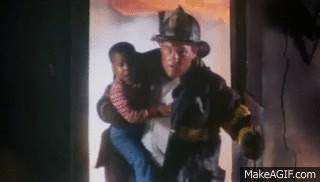Nomination: Best Effects, Sound Effects Editing - Gary Rydstrom and Richard Hymns
Nomination: Best Effects, Visual Effects - Mikael Salomon, Allen Hall, Clay Pinney, and Scott Farrar
Nomination: Best Sound - Gary Summers, Randy Thom, Gary Rydstrom, and Glenn Williams
I was seven years old when Backdraft was released, and though my parents - in a rare but understandable moment of parental censorship - did not allow me to see the film, I lost many nights of sleep while dreaming of my house burning in the fires shown in the trailer for Backdraft and experienced at the Backdraft attraction at Universal Studios Hollywood. While countless films and television shows have had scenes of dramatic fires since Backdraft, none have felt as real or dangerous.
One of the best remembered (and most ridiculed by real firefighters) lines from Backdraft comes from Robert De Niro's character Donald Rimgale: "(Fire is) a living thing. It breathes, it eats, and it hates." Yes, this line is goofy and overtly anthropomorphic, but it accurately describes the film's fires. The team of Mikael Salmon, Allen Hall, Clay Pinney, and Scott Farrar did outstanding work in creating the film's fire scenes. Though computer-generated effects can offer cinematic experiences that could never be produced by conventional effects, there's something about traditional effects that hasn't yet been replicated by computers. The fire scenes are dramatic in large part because the audience knows that real people are running through the fires as the scene is being filmed. Yes, they are stuntmen, but they are in much more danger than an actor in front of a green screen. Director Ron Howard and the effects team, working with the sound effects team of Gary Rydstrom and Richard Hymns, do wonderful work together in creating suspenseful, exciting, and oddly beautiful action sequences.
The scenes without fires, however, were not nearly as successful. One of the film's very first decisions - casting Kurt Russell in the dual roles of a father and a son - left me questioning Howard's judgment, and the bad decisions keep coming. William Baldwin's performance is easily mockable, the motivations behind the actions of characters are as silly as they are confusing. The film's biggest issue is that there are just too many plotlines, causing the film to wander. I loved De Niro's Rimgale, and would have gladly watched a film about his inspections of fires. Donald Sutherland is equal parts campy and scary, and J.T. Walsh is as great as always. Each of these characters could have been the protagonist of a film, and it's hard not to get the sense that any of these films would have offered a more compelling story than Backdraft.
The main story of the film, the rivalry and battles between brothers Steven and Brian (Russell and Baldwin, respectively), isn't terribly interesting. We've seen these brotherly battles before and since, and there are no surprises here. I always enjoy Kurt Russell, and his screen presence is undeniable, but with a weak script and a co-star that is fighting far above his weight class, Russell can't do much.
The structure is a mess, the acting is uneven, and the personification of fire all drag the film down. Yet with the one-two punch of unforgettable action sequences and the gifted trio of De Niro, Sutherland, and Walsh, I'll never change the channel when Backdraft is on TV.


